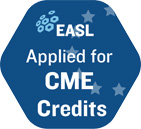Course directors
- Prof. Valérie Paradis, France
- Prof. Peter Schirmacher, Germany
- Prof. Joanne Verheij, The Netherlands
Program Overview / Summary
Liver Pathology
Inflammatory liver diseases: new developments, new challenges
With the endorsement of the European Society of Pathology (ESP)
The role of liver biopsy in inflammatory liver diseases has undergone major changes over the past decades. Clinical tests, non-invasive techniques, and imaging have improved. Since the indication for liver biopsies has changed, the number of liver biopsies in certain indications, like in viral hepatitis, has decreased. For many liver diseases, such as NAFLD, liver biopsy represents the gold standard. Yet the majority of patients with NAFLD will never undergo a biopsy. A liver biopsy is typically part of the initial diagnostic work-up for the diagnosis of auto-immune hepatitis.
For biliary diseases, however, a biopsy is not required for diagnosis. In these patients, histology may be very informative in ruling out concomitant auto-immune hepatitis or other liver diseases. New drugs, including immunotherapeutic agents in the field of oncology, may be associated with variable liver toxicities encountered and discovered. Despite infectious diseases of the liver being among the most prevalent health problems worldwide, biopsy strategies remain variable and changing.
When a liver biopsy is considered for diagnostic purposes, the major question is the benefit of the information the biopsy reveals, including the added value of the biopsy for the different diseases versus using non-invasive tests. These considerations are the main focus of this EASL School. The participants are invited to grade and stage different liver diseases, and to discuss the relevant scoring systems.
Each disease will be tackled from both a clinical point of view and from the perspective of the pathologist, focusing on criteria for diagnosis and possible pitfalls. The interaction between these partners is key, through this course and in daily practice.
Learning objectives
- the indications of a liver biopsy for the different inflammatory liver diseases
- the added value of a liver biopsy in relation to non invasive tests
- the grading and staging of the different inflammatory liver diseases
- the importance of the clinicopathological correlation for optimal benefit of a liver biopsy
- the future of pathology: new perspectives and novel technologies
CME accreditation
EASL School of Hepatology – Liver Pathology “inflammatory liver diseases; new developments, new challenges!”, Amsterdam, Netherlands, 15-10-2021-16-10-2021, has been accredited by the European Accreditation Council for Continuing Medical Education (EACCME®) for a maximum of 11 European CME credits (ECMEC®s).
Through an agreement between the Union Européenne des Médecins Spécialistes and the American Medical Association, physicians may convert EACCME® credits to an equivalent number of AMA PRA Category 1 CreditsTM. Information on the process to convert EACCME® credit to AMA credit can be found at www.ama-assn.org/education/earn-credit-participation-international-activities.
Live educational activities, occurring outside of Canada, recognised by the UEMS-ACCME® for ECMEC®s are deemed to be Accredited Group Learning Activities (Section 1) as defined by the Maintenance of Certification Program of the Royal College of Physicians and Surgeons of Canada
About the Pathology School
Relevant literature (pre-reading material, including scientific articles) will be provided to the participants before the meeting. Hand-outs will be provided after the course.
Clinical cases, including digitised biopsies, will be available before the start of the School.
During the meeting, complementary clinical and pathological talks will address relevant topics, with a general clinical introduction and followed by plenary discussions.
Clinical cases will be discussed per theme to illustrate the importance of clinico-pathological correlation, to discuss the role of the liver biopsy and the grading and staging of the different liver diseases.
Workshops, including slides sessions, will be planned to illustrate the morphological spectrum of inflammatory liver diseases.
Participants can supply interesting cases from their own institution (making them available before the start of the course to discuss during the workshop sessions).
A quiz application (via mobile phone) will be used to ensure interactive contribution of the participants.
Faculty
- Ulrich Beuers (Amsterdam, The Netherlands)
- Joep de Bruijne (Utrecht, The Netherlands)
- Minneke Coenraad (Leiden, The Netherlands)
- Otto van Delden (Amsterdam, The Netherlands)
- Joost Drenth (Nijmegen, The Netherlands)
- Onno Holleboom (Amsterdam, The Netherlands)
- Jesper Kers (Amsterdam en Leiden, The Netherlands)
- Rob de Man (Rotterdam, The Netherlands)
- Valérie Paradis (Paris, France)
- Cyriel Ponsioen (Amsterdam, The Netherlands)
- Peter Schirmacher (Heidelberg, Germany)
- Bart Takkenberg (Amsterdam, The Netherlands)
- Joanne Verheij (Amsterdam, The Netherlands)
About EASL Schools
The schools contribute to the training of new generations of hepatologists and are a major element of our association. Aimed at young fellows enrolled in hepatology-oriented departments or more experienced clinicians who want to be exposed to the newest trends in hepatology.
For selected applicants, EASL will cover transportation costs to attend the school and accommodation during the event (details will be provided individually once the selection process has been done).
Application is open to young fellows under the age of 35 (born after 17 September 1987) and/or still in training.
Approximately 30 places are available for each school and only EASL members are allowed to apply. Become an EASL member
Education is a priority for EASL and the association provides educational opportunities at every level. Traditionally, EASL Schools have been held in person, face to face. As the COVID-19 pandemic evolves, EASL may adapt to holding Schools online.
Due to strong interest in the EASL Schools, we have decided to give everyone additional time to complete and submit their applications. The new deadline is 23 February 2021. Please make sure your EASL membership is active before you submit your application.
Please make sure your EASL membership is active before submitting your application. Become an EASL member.
Please address your questions to schools@easloffice.eu and consult the Travel and attendance guidelines for EASL events


